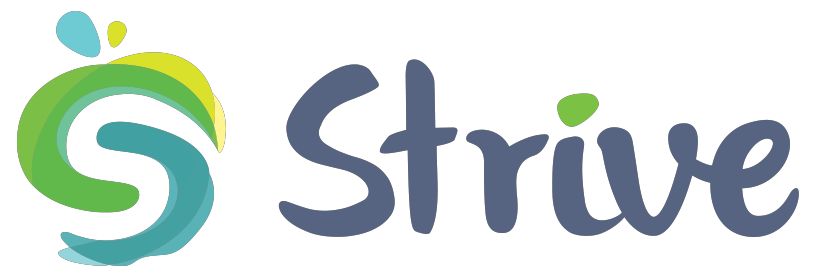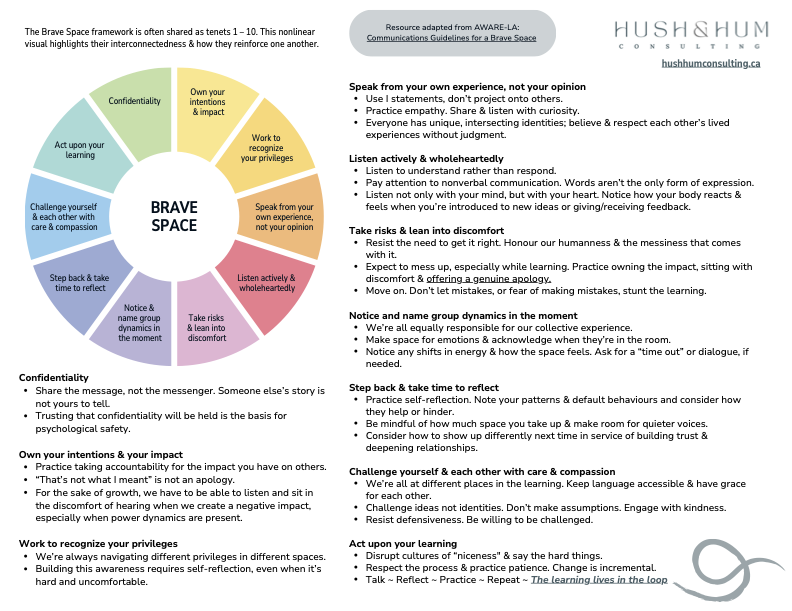WHAT ARE BRAVE SPACES?
When working in the Early Years field, it is vital to be reflective and to commit to continuous professional learning. We know that learning does not end with formal learning and that, as early years professionals, we need to seek outside perspectives, resources, and learning that challenges us.
In collaboration with Caitlin Villeneuve and Eaman Fahmy of Hush&Hum Consulting, the Strive team has been engaging in work to move beyond surface-level diversity, equity, inclusion and belonging (DEIB) and move towards creating and supporting Brave Spaces. This has facilitated the opportunity to better understand the complexities of this work by talking about uncomfortable truths, having engaging conversations, and thinking beyond ourselves.
First, we wanted to define the following terms:
Below are the ten tenets of Brave Spaces and some ways you can reflect and/or act on these tenets, as designed by Hush&Hum Consulting founders Eaman Fahmy and Caitlin Villeneuve:
What challenges can arise:
When we create Brave Spaces, it is not always easy and challenges can arise, such as,
Experiencing fear of saying the wrong thing
Feeling resistant to discomfort
There may be power dynamics between team members
Limited time to having deep conversations
Trouble balancing care and accountability
These challenges are real and valid, and it’s important to acknowledge them. However, the purpose of Brave Space is not to eliminate discomfort and avoid difficult conversations. Instead, it’s about creating a space where we can face these challenges with honesty, vulnerability, and mutual support. In Brave Space, growth happens through open dialogue, active listening, and a shared commitment to learning even when conversations are uncomfortable.
Reflection questions to help support your journey:
What processes do you use, or will you begin to use to audit your learning and reflection?
How can you nurture these skills and dispositions through your work with children?
How do you model empathy, curiosity, and listening in practice?
What ways can you support and guide your team members when creating and supporting brave spaces?
Continuous Learning & Resources:
To continue to deepen your understanding of Brave Spaces, please take a look at the following resources:
Leading Inspired Learning: Episode 58 - “Moving Beyond DEIB with Caitlin Villeneuve and Eaman Fahmy”. In this episode, Kayla, Strive Professional Learning Lead, hosts Caitlin Villeneuve and Eaman Fahmy of Hush&Hum Consulting, to explore ways educators and leaders can move beyond a checklist approach to DEIB!
Leading Inspired Learning: Episode 60 - “Introducing the Brave Space Framework with Caitlin Villeneuve & Eaman Fahmy”. In this episode, Kayla, Strive Professional Learning Lead, is joined once again by Caitlin Villeneuve and Eaman Fahmy of Hush&Hum Consulting to explore the Brave Spaces Framework!
The 1 Page resource from Hush&Hum Consulting is available for download here: www.hushhumconsulting.ca/resources-5-1-1
Pillar’s Brave Space Guidelines: pillarnonprofit.ca/news/pillar-brave-space-guidelines-2024
Strive Team Reflections on our DEIB / Brave Space Work
“The distinction Eaman and Caitlin spoke to regarding being unsafe and uncomfortable has continued to stay with me. As a facilitator in community conversations while also entering programs and spaces, it invited me to reflect and sit with discomfort, to be open to unlearning, and to recognize when defensiveness is often a response to being challenged.
As someone who steps into a variety of early years settings, I see how essential it is to model vulnerability and openness. To listen deeply, to acknowledge lived experiences different from my own, and to use my role to foster spaces where educators and leaders feel empowered to engage in hard conversations. It’s not about having the right answers but about cultivating environments where reflection and care can coexist.
Bringing this learning into my own practice means I now ask different questions, observe more attentively, and hold space with more intention. It means recognizing that the work of DEIB is never finished and that Brave Spaces are not created by one person alone. Brave spaces are co-constructed through relationships, trust, and shared responsibility.
This experience continues to shape how I grow, both personally and professionally. It has affirmed for me that the most meaningful learning often happens when we are willing to step into discomfort with humility, care, and a commitment to doing better together.”
“Eaman and Caitlin used their extensive knowledge and resources in incredibly impactful ways, especially when exploring the nuances between niceness and kindness. This was a concept I had previously struggled with. I often found myself hesitant to disrupt the status quo, defaulting to “niceness” to keep the peace, even when something didn’t sit right with me.
Their training helped me understand that niceness is about being agreeable, avoiding conflict, and maintaining appearances, while kindness is rooted in empathy, integrity, and doing what is right, even when it’s uncomfortable. Kindness isn’t always easy or quiet; it can mean speaking up, setting boundaries, or challenging harm in respectful but direct ways.
The knowledge Eaman and Caitlin shared truly empowered me. I now feel more confident in standing up during uncomfortable situations and challenging difficult rhetoric or conversations. I’ve become more intentional about sharing what I’ve learned with others, offering resources, opening space for reflection, and calling people in when inappropriate language or comments arise. Integrating this shift into my practice has not only supported my own growth, but it has also strengthened the relationships and learning communities I am in.”
“Our team’s work with Brave Space started in consultation with Caitlin and Eaman of Hush&Hum Consulting. We were reflecting as a team on a statement from our strategic plan. It stated, "Embedding equity, diversity, and inclusion in all we do, we will: Build Capacity... Advance Mentorship... Strengthen Leadership”. In reading this, we found it was a challenge to define and act on what this meant. Some questions we bumped up against were- Where did we start? What were the priorities? Were we knowledgeable and comfortable with being facilitators of this work in the community? In seeking support from Eaman and Caitlin, we were not certain of what we needed, but we knew increasing capacity to engage in the work, becoming comfortable with discomfort and terminology, and facilitation were key components.
A few things became clear early on in our work. Firstly, because our team was growing so quickly, we did not all have strong or long-term relationships and trust was still growing. This made DEIB work difficult, because it is rooted in trust. Second, many of us struggled to use language and terminology that we have learned in DEIB work in conversation. We had accumulated a lot of knowledge but struggled to move to action or recall and apply the learning. Third, we did not have confidence in our presence in this work. After doing some team building and growing trust, we came to a point in our journey of engaging Brave Space to curate conditions for the conversations and work to happen.
Brave space has offered our team more honest conversations, deeper connection, and the confidence to acknowledge and admit when we are unsure of or do not know about something. Most meaningfully, it offers us space to see each other as humans and note that this is always work in progress and will never be done.
We recently had a professional learning session for leaders about Brave Space, and something that I continued to reflect on during the session was how much this work and this support through Brave Space has offered me as a leader. While we learned so much in our consultation, Brave Space continues to be a tool that I lean on to keep me honest, to humble me in my work, and to embed authenticity in relationships. Being able to say “hey, I do not know the answers, but I am really interested in exploring this together to learn more” and demonstrate the vulnerability of the learning process has lifted the weight I was feeling under perfectionism and the need to “know the answers” as a leader. While brave space supports work in discomfort as we move towards more equitable spaces, it can also offer strength and comfort in the relationships it fosters.”





